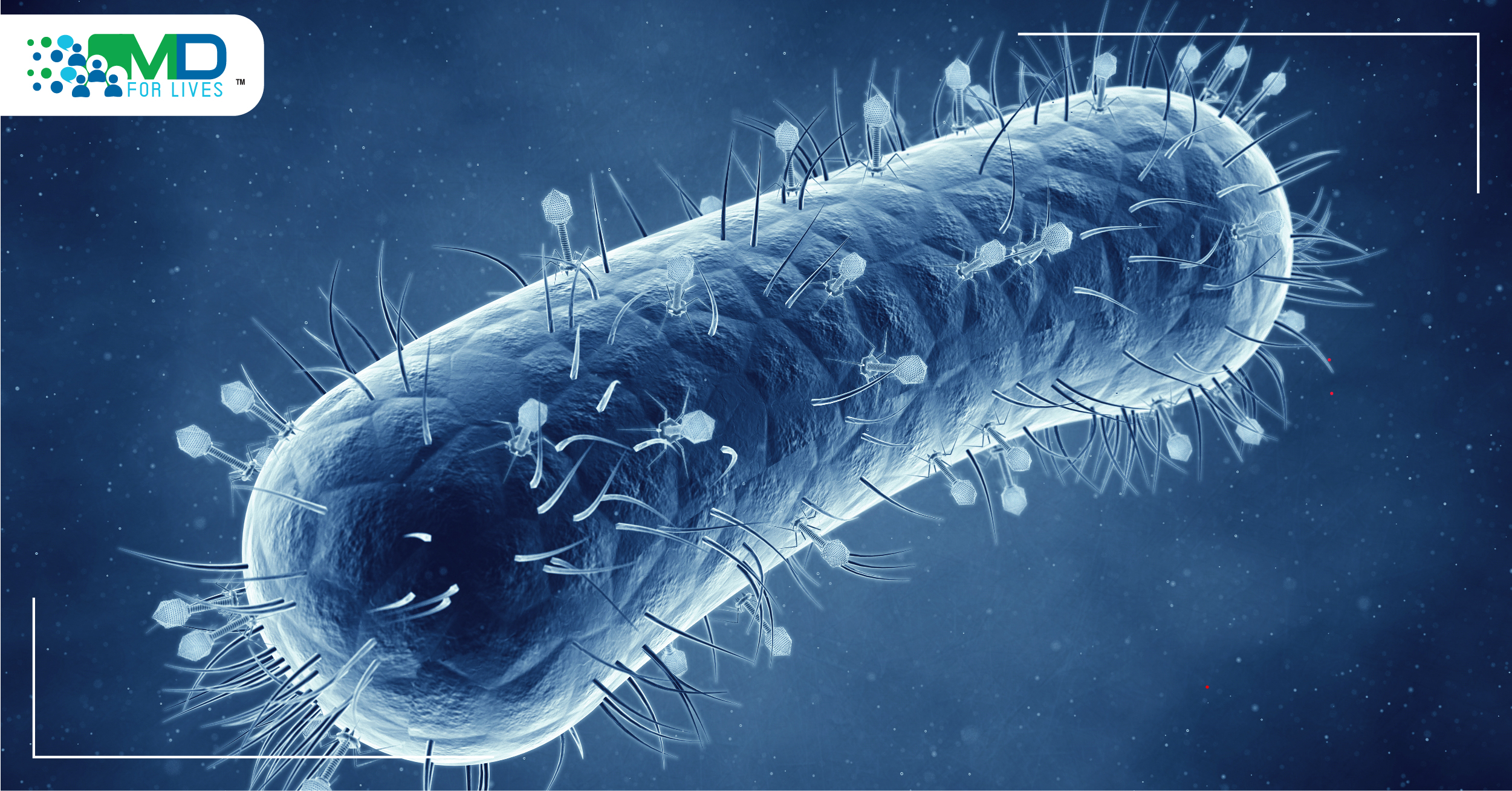Phage therapy – the treatment of bacterial infections with viruses that attack those bacteria – was used in the early 20th century but was largely abandoned when antibiotics became available. Now, in the era of antibiotic resistance, scientists and clinicians are taking a second look.1
Research in humans is still in its early stages, but there have been promising findings in recent animal studies. One 2021 study showed that phage viruses can successfully treat mice infected with antibiotic-resistant Klebsiella pneumoniae bacteria.2,3 Another found that phage treatment can enhance the activity of other antimicrobial agents in vitro and in an insect model.4

Early successes with phage therapy
In the 1920s, phage therapy was used to treat cholera, shigellosis, and typhoid fever.1 With the advent of antibiotics, phage therapy research was largely abandoned in the US but continued in Eastern Europe and the Caucasus region.1
No phage therapy is currently FDA-approved in the US, but in the last few decades, over 50 US patients have been experimentally treated with phage for severe infections in which other treatment options had failed.
These treatments have shown success in individual patients. One example is a patient who developed a multidrug-resistant Acinetobacter baumannii infection and sepsis after a bout of pancreatitis. After all available antibiotics had failed, the man was treated at UC San Diego with intravenous bacteriophages and came out of his nearly two-month coma within three days.5

Another example is a patient with a long-standing prosthetic vascular graft infection with Pseudomonas aeruginosa and repeated bouts of sepsis. The Yale School of Medicine team applied bacteriophage directly to the infected site while antibiotic treatment was continued; the man remained free of signs of infection thereafter.6
Clinical trial challenges
Only a few randomized clinical trials with phage therapy have yet been performed, and they have faced challenges. Of three recent human trials of phage therapy, only one – a very small, randomized trial on otitis media – showed some success.7 Patients treated with phage (n=12) showed significantly lowered P. aeruginosa counts and clinical improvement compared with placebo patients (n=12).7 A trial of phage in childhood bacterial diarrhea in Bangladesh and a trial of phage for urinary tract infections in Tbilisi, Georgia, did not show an advantage for phage over placebo.8,9
New clinical trials are showing promise, though. Several current studies target Pseudomonas aeruginosa, an opportunistic pathogen that often becomes resistant to antibiotics. Armata Pharmaceuticals and the Cystic Fibrosis Foundation are conducting a trial of inhaled phage therapy to control P. aeruginosa infections in patients with cystic fibrosis.10

An intravenous formulation of phages against P. aeruginosa is the subject of a trial led by researchers at John Hopkins and the UC San Diego School of Medicine; the latter maintains a large library of phages against many different bacterial strains. The investigators say that they have seen success in early treatments.11, 12
One of the biggest challenges with bacteriophage therapy is that bacteria can quickly develop resistance to a given phage strain. Some researchers are trying to turn this into a feature. Paul Turner and colleagues have been investigating bacteriophages that bind to the efflux pumps that bacteria use to get rid of antibiotics, making antibiotic resistance potentially more difficult and costly for bacteria to acquire. This could help stave of the development of antibiotic resistance by forcing the bacteria into a tradeoff between resisting the antibiotics and resisting the viruses.13
Similarly, Yale Phage Therapy 01 (YPT-01) is a cocktail of phages chosen for their ability to drive evolutionary tradeoffs in their target, Pseudomonas aeruginosa. Cystic fibrosis patients with chronic P. aeruginosa infections are currently being recruited for a Phase 2 clinical trial of YPT-01 that will be nebulized for inhalation. The researchers hope that when the bacteria evolve resistance to the phage therapy, they will become less virulent.14

References
- https://www.cell.com/cell-host-microbe/fulltext/S1931-3128(19)30052-6?_returnURL=https%3A%2F%2Flinkinghub.elsevier.com%2Fretrieve%2Fpii%2FS1931312819300526%3Fshowall%3Dtru
- https://www.nih.gov/news-events/news-releases/mouse-study-shows-bacteriophage-therapy-could-fight-drug-resistant-klebsiella-pneumoniae
- https://journals.asm.org/doi/10.1128/mBio.00034-21
- https://journals.asm.org/doi/10.1128/AAC.00900-21?utm_source=literatum&utm_medium=email&utm_campaign=alert-emails&
- https://health.ucsd.edu/news/releases/pages/2017-04-25-novel-phage-therapy-saves-patient-with-multidrug-resistant-bacterial-infection.aspx
- https://www.ncbi.nlm.nih.gov/pmc/articles/PMC5842392/
- https://onlinelibrary.wiley.com/doi/full/10.1111/j.1749-4486.2009.01973.x
- https://www.thelancet.com/journals/laninf/article/PIIS1473-3099(20)30330-3/fulltext
- https://pubmed.ncbi.nlm.nih.gov/26981577/
- https://www.cff.org/About-Us/Media-Center/Press-Releases/CF-Foundation-Announces-up-to-5M-Award-to-Support-First-Ever-Controlled-Clinical-Study-of-Phage-Therapy-in-Cystic-Fibrosis/
- https://hub.jhu.edu/2021/05/04/bacteriophage-antibiotic-resistance/
- https://academic.oup.com/ofid/article/7/9/ofaa389/5898206#.X0iBGLLDvKU.twitter
- https://www.cell.com/cell-host-microbe/fulltext/S1931-3128(19)30052-6?_returnURL=https%3A%2F%2Flinkinghub.elsevier.com%2Fretrieve%2Fpii%2FS1931312819300526%3Fshowall%3Dtru
- https://cysticfibrosisnewstoday.com/2021/01/12/phase-1-2-trial-at-yale-testing-phage-therapy-chronic-p-aeruginosa-infections-in-cf/






